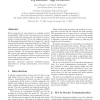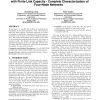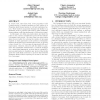8 search results - page 1 / 2 » Finding Traitors in Secure Networks Using Byzantine Agreemen... |
IJNSEC
2010
12 years 11 months ago
2010
Secure networks rely upon players to maintain security and reliability. However not every player can be assumed to have total loyalty and one must use methods to uncover traitors ...
PODC
2010
ACM
13 years 6 months ago
2010
ACM
In this paper, we consider the problem of maximizing the throughput of Byzantine agreement, when communication links have finite capacity. Byzantine agreement is a classical probl...
CRYPTO
2006
Springer
13 years 8 months ago
2006
Springer
In a seminal paper, Feldman and Micali (STOC '88) show an n-party Byzantine agreement protocol tolerating t < n/3 malicious parties that runs in expected constant rounds. H...
PODC
2012
ACM
11 years 7 months ago
2012
ACM
In recent years, there have been a few proposals to add a small amount of trusted hardware at each replica in a Byzantine fault tolerant system to cut back replication factors. Th...
DSN
2002
IEEE
13 years 9 months ago
2002
IEEE
This paper describes a Secure INtrusion-Tolerant Replication Architecture1 (SINTRA) for coordination in asynchronous networks subject to Byzantine faults. SINTRA supplies a number...



